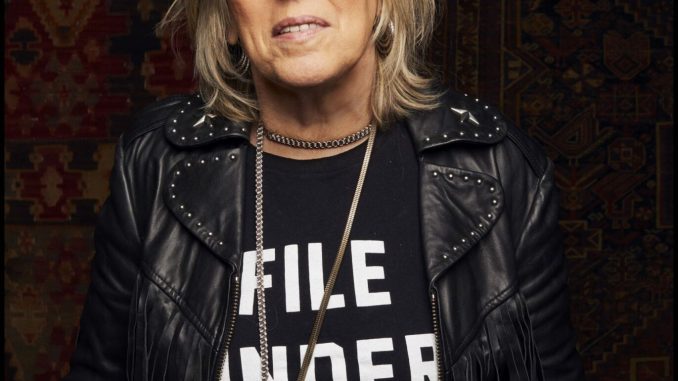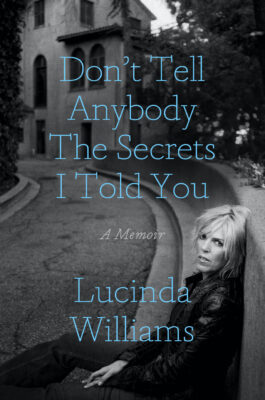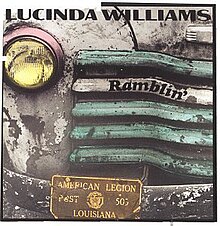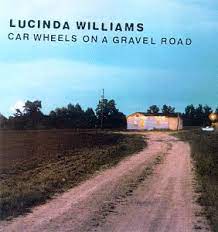
Lucinda Williams is a survivor. What else do you call someone who survives a debilitating stroke at the age of 67 and rather than give in, she rallied back following a week spent in intensive care in late November 2020 after a blood clot on the right side of her brain impaired the left side of her body’s motor skills? From here, the Louisiana native endured long rehabilitative stints that forced her to relearn many basic activities like walking.
Three years later, Williams is out touring behind Stories From a Rock and Roll Heart, in addition to promoting her warts-and-all memoir Don’t Tell Anybody the Secrets I Told You.
 At a recent show at Manhattan’s City Winery, Williams was strong of voice, despite still having a tentative gait when moving around the stage. But what was still readily apparent was her role as a storyteller willing to set the stage for those musical narratives populated by the numerous “beautiful losers” she’s crossed paths with in her life. It’s not a far leap for these descriptive anecdotes that define classics ranging from “Drunken Angel” and “Lake Charles” to newer cuts like “Hum’s Liquor” (about late Replacements guitarist Bob Stinson) to fall somewhere between being humorous and tragic, sometimes within the same sentence. As for why she decided to tackle an autobiography, it was the next logical progression of the storytelling Williams engages in from the stage whenever she’s on tour.
At a recent show at Manhattan’s City Winery, Williams was strong of voice, despite still having a tentative gait when moving around the stage. But what was still readily apparent was her role as a storyteller willing to set the stage for those musical narratives populated by the numerous “beautiful losers” she’s crossed paths with in her life. It’s not a far leap for these descriptive anecdotes that define classics ranging from “Drunken Angel” and “Lake Charles” to newer cuts like “Hum’s Liquor” (about late Replacements guitarist Bob Stinson) to fall somewhere between being humorous and tragic, sometimes within the same sentence. As for why she decided to tackle an autobiography, it was the next logical progression of the storytelling Williams engages in from the stage whenever she’s on tour.
“It wasn’t one of those things where I said, ‘Hey, I’m going to write a book and I’m going to start today,’” she explained. “It sort of just happened over time. The book is just an extension of what I never had enough time to do on stage to go into detail about things. Or maybe I didn’t want to go into detail at that time or in that position, being on stage in front of an audience. When we did the Car Wheels [On a Gravel Road] tour, I went into detail more. And it really just kind of took off.”
Tackling this kind of project took five or six years and while it was started pre-stroke, the singer-songwriter carried the self-imposed pressure of living up to her late father, renowned poet Miller Williams, to whom the book is dedicated.
“It’s kind of funny, I wanted it to be well written with my dad of course having been a writer,” Williams said. “I thought that it would have to be like my Great American novel or something. I always pictured when I did this that I was going to go away and get a cabin in the woods or something and write this book. But it didn’t really work out that way. I was at my house like I always was.”
Williams’ self-admitted perfectionist tendencies dogged her, particularly given the different writing muscles she had to engage in while trying to write a book.
“I wasn’t used to the looming deadlines that kept rearing its ugly head,” she said. “I kept wanting to fix and change things. I would have a piece that was written. [My husband] Tom [Overby] would type it out and we would send it to the editor and each time they would send the whole draft of the book with that in it. And I would read through the whole thing and I’d want to edit again. Tom is saying, ‘The book is done Lu. You can’t keep changing things. It’s coming out. It’s done.’ And I’m going, ‘No, no. I’ve got to change this part. It doesn’t sound right. It’s going to hurt someone’s feelings.’ I had a really hard time with that sort of thing.”
Not unlike her songs, Don’t Tell Anybody is poignant, straightforward and honest. Williams’ journey to the commercial success she achieved as a late bloomer “…well into her forties” is well chronicled from a childhood bouncing around with her professor father following her parents’ divorce and living in 12 cities and two countries (Chile and Mexico) before she was 18 to recording her 1979 debut Ramblin’ On My Mind for storied imprint Folkways Records.
 Under the best of circumstances, familial dynamics are complicated and so it went for Williams, who unflinchingly writes about grappling with her mother’s mental illness and navigating the relationship with her stepmother, one of her father’s students young enough to be a sibling. But through it all, the reader gets a full taste of Williams’ journey that includes family lore (father Miller crossing paths with Hank Williams, Sr.) and navigating the stop and starts of the music industry that included her being mischaracterized as difficult in the wake of her critical and commercial success with 1998’s Car Wheels On a Gravel Road. But through it all, Williams confesses the process proved to be healing.
Under the best of circumstances, familial dynamics are complicated and so it went for Williams, who unflinchingly writes about grappling with her mother’s mental illness and navigating the relationship with her stepmother, one of her father’s students young enough to be a sibling. But through it all, the reader gets a full taste of Williams’ journey that includes family lore (father Miller crossing paths with Hank Williams, Sr.) and navigating the stop and starts of the music industry that included her being mischaracterized as difficult in the wake of her critical and commercial success with 1998’s Car Wheels On a Gravel Road. But through it all, Williams confesses the process proved to be healing.
 “It was all sort of therapeutic,” she admitted. “Writing the book made me miss my mother and my father a lot. As I was going through it, I realized they were really great people. I guess it made me understand them more in a way in terms of what they went through. Like in the beginning, when we didn’t have much money and my dad was bouncing from job to job. My dad had written some sort of a homemade memoir, which he gave to each member of the family. I read his, so I was able to take some of his and apply it to mine because he had great memories about his father. Needless to say, his was really well written. Mine had to be as good as that. I imagined my dad being at my side while I was writing, looking over my shoulder and me being able to ask him what the best way was to word something. It made me miss him like crazy and how proud he would have been of me.”
“It was all sort of therapeutic,” she admitted. “Writing the book made me miss my mother and my father a lot. As I was going through it, I realized they were really great people. I guess it made me understand them more in a way in terms of what they went through. Like in the beginning, when we didn’t have much money and my dad was bouncing from job to job. My dad had written some sort of a homemade memoir, which he gave to each member of the family. I read his, so I was able to take some of his and apply it to mine because he had great memories about his father. Needless to say, his was really well written. Mine had to be as good as that. I imagined my dad being at my side while I was writing, looking over my shoulder and me being able to ask him what the best way was to word something. It made me miss him like crazy and how proud he would have been of me.”
And in the middle of all this, Williams stopped long enough to cut Stories From a Rock and Roll Heart, a tight 10-song collection that features cameos from the likes of Bruce Springsteen, Patti Scialfa, Margo Price and Tommy Stinson. And while the stroke robbed Williams of the ability to play guitar, a creative relationship dating back to when she was 12 and was totally gob-smacked by Highway 61 Revisited, she figured out a work-around with the help of Overby and guitar-playing road manager Travis Stephens.
“The main thing on this record was that I opened myself up to collaborating on the songs with other people, which I’d never really been open to before,” she said. “It came mostly out of necessity. Since I couldn’t play guitar, Travis, who is a singer-songwriter, jumped in said he could be me on the guitar and just tell him what I had on my mind. I could think of melodies in my head and I could still write lyrics. I had always written songs by myself—just my guitar and me. It was pretty straight ahead. This was a lot more challenging. Tom and Jesse Malin proved to be a huge help.”
With Williams and Overby having co-produced Malin’s 2019 outing Sunset Kids, the Queens native proved to be a great creative foil.
“Jesse is a really good songwriter whose talents I really came to appreciate,” Williams said. “I just hadn’t been aware of it as much before. That is what led to him coming in when I was working on this stuff. He would fly into Nashville from New York which is an easy flight. We’d get together at our house and sit around the kitchen table. That’s what happened. I think we came up with a good batch of stuff.”
Lucinda Williams will be appearing on October 27 and October 28 at the Beacon Theatre, 74th Street & Broadway, NYC. Visit www.beacontheatre.com or call 866-858-0008 for more information.

